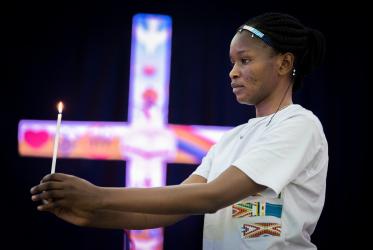Rev. Dr Olav Fykse Tveit, general secretary of the World Council of Churches (WCC), speaks about violence committed
in the name of religion, human rights and struggles for climate justice in Brazil, in an interview with Marcelo Schneider of WCC Communications. Tveit is currently in Brasilia, leading a WCC delegation as part of a “pilgrimage of justice and peace.”
Religious intolerance is a real issue for Brazilian churches. How can violence against religious and ethnic minorities happen in the name of the Christ?
The news about violence against religious, ethnic and social minorities perpetrated by some Christian groups in Brazil worries me deeply. It also makes me angry to see how Christian identity is used to perpetrate violence. We have to say together as Christians: “Not in the name of our Lord Jesus Christ. Not in our name as churches!”
Religiously motivated violence is an important issue for the churches. At the WCC, we have discussed how violence carried out in the name of the religion can be addressed properly. This will be discussed at the next WCC Central Committee meeting.
What is your opinion about the “majority-minority” dynamics in Brazil?
A society that takes care of its minorities (including religious or ethnic groups) is a society that is good for the majority. A society that is not capable of giving political, economic and social rights to its minorities is not a good society for the majority.
A society with large social and economic gaps creates a lot of problems for its people. It can help a great deal if majority groups find ways to address issues of religious freedom, for example. They all must see the benefit of having regulations, laws and conditions that secure equal rights. Therefore it is important that churches struggle together and for the rights of other religious groups. It is part of our Christian commitment to care for the other, and not only care for our own church.
During your meetings with church representatives in Brazil, what issues have emerged as most striking to you?
I have often heard how indigenous peoples, Afro-descendants, immigrants and other communities who belong to lower economic classes are very vulnerable in Brazil. In Brazil, these are challenging issues for the whole society. Therefore, I am happy to see how the National Council of Churches in Brazil (CONIC) is serving, supporting and empowering these communities as part of a Christian mission.
What role do you think Brazil can play to ensure climate justice and human rights?
Brazil, due to its nature and size, holds an enormous part of the world’s rain forests. The country does play in several ways a significant role in addressing climate change and has made significant commitments for reductions of greenhouse gas emissions. Brazil will be a key actor at the UN Climate Change Conference (COP 21) in Paris at the end of the year.
Brazil is also committed to playing a strong role in the human rights area, in addressing issues from the past, impunity and bringing about a process of reconciliation.
Brazil has many natural, political, human and spiritual resources. It’s a country of so many gifts. It is inspiring to see that this country has found a new way to share these gifts. Therefore, it is so important that this is not reversed amidst the current political challenges.
What are your impressions on “Christian mission,” especially in the Brazilian context?
Brazilian churches are very committed to mission. During my meetings, I have observed that a common understanding of mission among churches includes that of a “holistic mission” and “the diaconal ministry of the church,” particularly to those who are at the margins of society.
I presented here the new WCC mission statement, entitled Together towards Life, and shared its vision, in which we don’t see mission only from a center but from the margins of the societies. Brazil is a country where many churches do mission on the local level in a way that exemplifies the expression “mission from the margins.” I see that the churches here in Brazil realize their calling to follow Christ by taking care of those who need them the most and by fighting for justice and peace.
How are churches in Brazil responding to the call for “pilgrimage of justice and peace”?
I am encouraged to see that the call to join WCC “pilgrimage of justice and peace” as a common journey of faith in addressing injustices and conflicts in Brazil, makes sense to the churches. This is the time to be united as churches and to be open for new partnerships for justice and peace.
The call to the churches and people of good will to join a “pilgrimage of justice and peace” was issued by the WCC 10th Assembly in Busan, Republic of Korea, 2013.
WCC Pilgrimage of Justice and Peace







